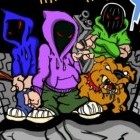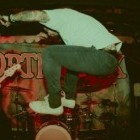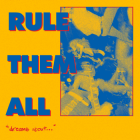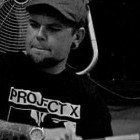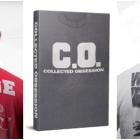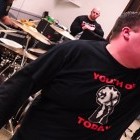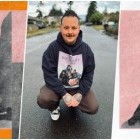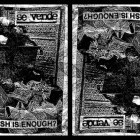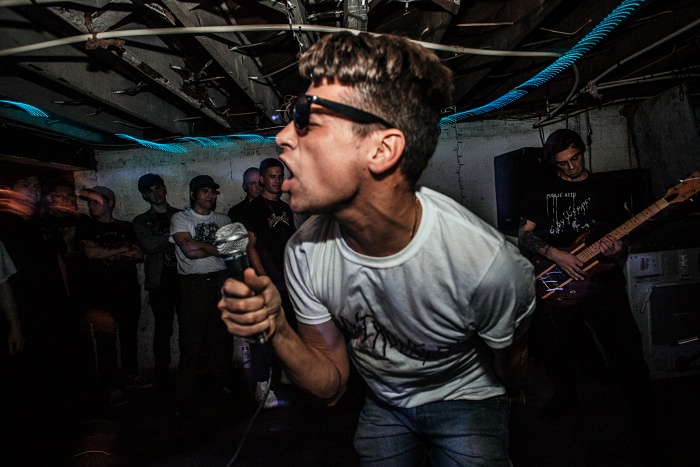
11PM Records is a relatively new label, which is quickly making a name for itself. Based in the punk rock hotbed of Richmond, VA, the imprint has cranked out five crucial slabs of ferocious and essential hardcore in the last year and shows no signs of slowing down soon.
I sat down with label boss, Patrick Walsh, recently to discuss what makes the label tick, where he draws inspiration and what the future holds.
Let’s start with a cliché, how did you get into hardcore?
It’s definitely living in Richmond, a thousand percent. Growing up outside of Richmond, listening to Bracewar was just something we did. No matter who you were. That was a universal... Or Down to Nothing, but those bands weren’t really my thing. Then I got into Government Warning. That was the first punk show I ever went to, I was 16 or 17. And I got into that through RVA Magazine. Their first free issue had a list of local bands and I listened to every single one of them.
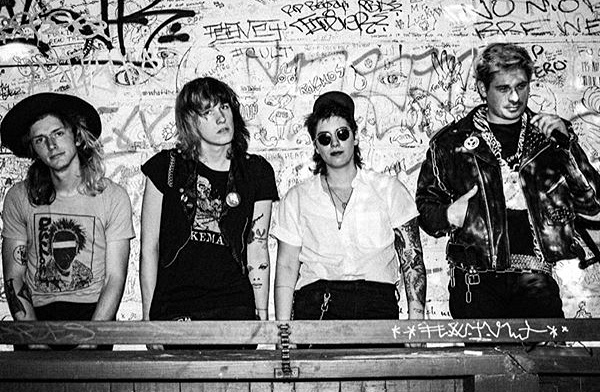
What was it about Government Warning appealed to you more than Bracewar or Down to Nothing?
Richmond is a punk town. It has been so for so long that I feel like in a lot of ways it’s more weighed down by its legacy than has been helped. I mean, jocks or preppy dudes at my high school… they were all listening to Down to Nothing, Bracewar—I was more into ska and indie music, I was more of a nerd or whatever but, I also liked skate punk like Rancid, all that shit. Government Warning was a band like that for a lot of people. Kind of like how Night Birds are now, where it kind of has elements of skate punk, but it’s definitely a hardcore band. So I saw them, then I went to the second No Way Fest a few months after, and those are still a lot of my favorite bands.
So that’s sort of where I’m at with the label... I left Richmond, for awhile, then came back and was doing my band, Mad Existence--it was a hardcore punk, Youth Crew, weird little mishmash, in a time when a lot of bands were doing that similar style.
Everyone loved 86 Mentality. I love 86 Mentality. There were bands like Pure Disgust, The Flex—they were the big deal. So I started meeting these kids, like actual kids, good five or six years younger than me, who were coming to Richmond, and they would know about certain bands from the No Way-era, but they might not know about all of them. They had probably grown up more on bands like Down to Nothing, but they were getting into this as a thing from the past—they were doing these bands that were influenced by 86 Mentality, they were really into Government Warning. And so we just started becoming friends ‘cause I was really inspired by them.
It’s kind of what we were doing in high school with '80s hardcore bands, they were doing for the stuff that I was in high school for. So I started meeting all these people four or five years ago, and that was the original foundation of the label, was us just trying to be in bands influenced by that era.
The first release you did was your own band, Deviant—was the intention with the label always you were going to do something more, or was it just, I’m gonna do my own band?
I had told my band, “Look, we’re all getting older. I wanna do my band, on a label I’m gonna start. If it goes well, I’ll put out other records. If not, then I won’t.” And then we did this one tour last March down South, where every single band that played with us, was good. Every. Single. One. It was mind-blowing. We toured so much this past year. We did a Canada-Chicago loop thing, we did up to New York, and then we did another trip down South. We did those two weeks apart from each other, so we were constantly going.
I would go to these parts of the country and a lot of them don’t have the infrastructure that Richmond has—they don’t have other people that are supporting them or don’t necessarily know how to do things. I’d put out the Deviant record and I was like, “I wanna get with a bunch of these people and help them out.” Like, the bands that were inspiring me, because I don’t think I would have found out about a lot of them if I hadn’t done that tour.
Did you want the label to have a Southeast, Southern perspective, or is it more about like... I mean, I know you’ve done the Gazm (from Montreal) record but….
When I started, I wanted it to be all bands from the South. There’s this label in Miami that my friend runs, called Invisible Audio. They are tape-only and they do demos for all these Florida bands and Southern bands… they did so many tapes in one year, it’s kind of crazy. A lot of the bands weren’t necessarily able to tour, ‘cause of vans or just member changes and stuff. They were my main inspiration and I wanted to do records for some of the bands—get them to take it more seriously, start working on helping them tour and stuff, ‘cause I don’t just put out the record and go away. I usually am always like, “Can I help with anything?” or “I had this idea,” or I’ll link people together. But now, I feel like because Protocol and maybe Jackal have toured more, there’s more bands in the country they’re sort of linking on, so it’s definitely, already even two releases in, not just a Southern thing because it’s already expanded some...
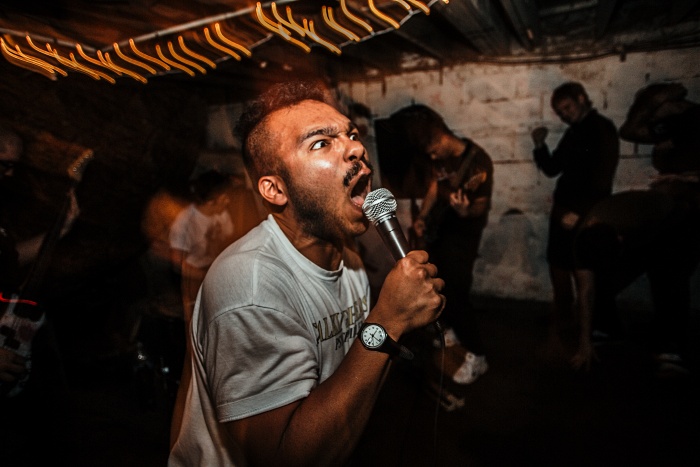
So what is the main driver behind doing the label for you at this point?
I’m trying to bring back the '80s US hardcore sound. But not even bring it back; ‘cause it’s already there, I’m just trying to push it. I’m trying to, partially, give Richmond a new identity through it and… What else? I don’t know. There are a lot of weird motives I have about this stuff, but I’m kind of trying to create a new... A lot of labels are based almost around cliques. You can tell you’re like, “Oh this band started. These people are in it, they’re gonna be on this label,” you know what I mean? I’m really trying to make sure most of the bands get along.
For a lot of these bands, if we put them in the same room, they would end up becoming friends anyways. It’s the same kinda people all over the country making music. They’re sort of... A lot of them have very different backgrounds, but sort of similar backgrounds. A lot of them are music nerds. You can just talk to them about any genre and they’re just all about it. And a lot of them are promoters in their cities, they’re highly involved in DIY, in every aspect.
When you’re thinking about your label, what labels inspire you? Do you see yourself being more flash in the pan with it, or do you want it to be a long time label?
I really like hobby labels, if that makes sense, that’s what I refer to myself. I like labels that are a little bit more like flash in the pan, but capture something partially by accident ‘cause they’re just doing what they’re into. I’m inspired by these flash in the pan labels where… they were in the same position we are now where it’s just, nobody’s making the kind of music we want, so we’re all making it.
I really liked these labels that existed for a little bit called Feeble Minds and Drugged Conscience. Some of their releases were cool, some of them weren’t, but they were really cool... I was really into Fashionable Idiots, I think that label’s good. Stuff that is like... I’m also really inspired by Deranged. I can’t not mention Deranged Records, classic label—in my mind it’s a total modern classic. That label is a little bit longer lasting but... If this wave ends, I think the label will probably end with it or it’ll change in some way. It’ll change its name. I don’t wanna be a monolith. I wanna treat the bands as good as possible, but I don’t wanna be some label that’s bogged down by catalog or whatever.
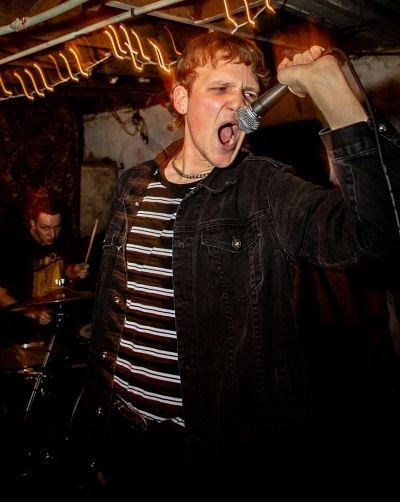
Is there any concern at all with wanting to keep things in print even if you’re not really actively doing the label anymore? Or is it more just sell 300 or 500 copies and move on?
I honestly wonder… and I wondered this before I did the label, but I wonder how much putting out vinyl actually does for the band, or music in general. Or if people are going to still buy records in two years. And I’ve made it so I’m okay with it. I’m definitely pushing it and trying to get more people to buy records as much as possible, but it’s interesting to have the conversation with people where it’s like, “Why do you buy records? Why don’t you buy records?” Do you know what I mean?
It’s definitely something I think about a lot, ‘cause I sold my record collection 10 years ago. I don’t own records anymore. Everything I do is digital at this point. But I still views tangible objects as being important. How does that play into it?
I always tell the bands that the cover is way more important than whatever you put on it. ‘Cause 90% of the people aren’t ever gonna pull the record out and listen to it. I wonder, sometimes, if I just packed the records without the actual record, how many people would notice?
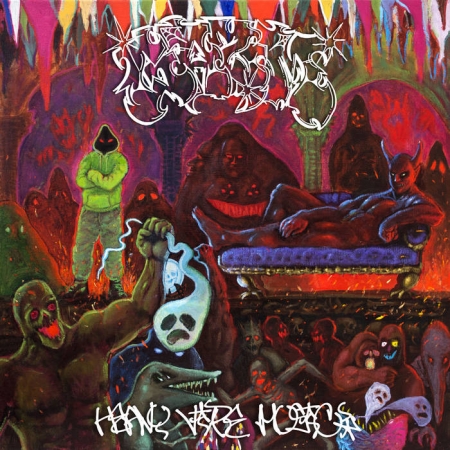
Yeah. Do you really think that’s a thing, though?
Yeah, I’m positive.
That people never listen to the records?
I have a few peers that are pretty big dorks about records but it seems to be cordoned off into genres. Being a Japanese hardcore collector or a black metal collector, where that’s still a part of the genre, while with hardcore I don’t always know that it is anymore—I think that for a lot that the older fans of hardcore, it is, so to legitimize younger bands, you have to press it on vinyl. I really believe this, ‘cause I think that a lot of the YouTube stuff that happens was more flash in the pan because it wasn’t really pressed as a record. Do you know what I mean?
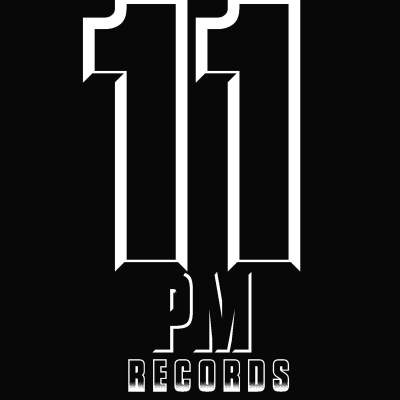
So how many records are you pressing for bands days?
I’m doing 300 copies pretty much, and I’m doing a lot of it split with other labels, but a lot of is just I’m trying to do everything as fast as possible. I’m trying to go into maximum overdrive, so I don’t wanna lose that much money all at once. So I’m trying to keep it buoyant, I don’t know if that makes any sense. I don’t really know what even life is gonna be like two years from now, so I’m trying to do as many releases as possible from this group of people. I’m trying to do 10 releases in a year.

10 releases in a year?
So the year started in February. I have the other two lined up, I’m gonna line one up maybe tonight. So we’re gonna be at seven and then I’ll probably do three after that. I’m really serious—I’m trying to do 10 a year. It’s gonna be so stressful but...
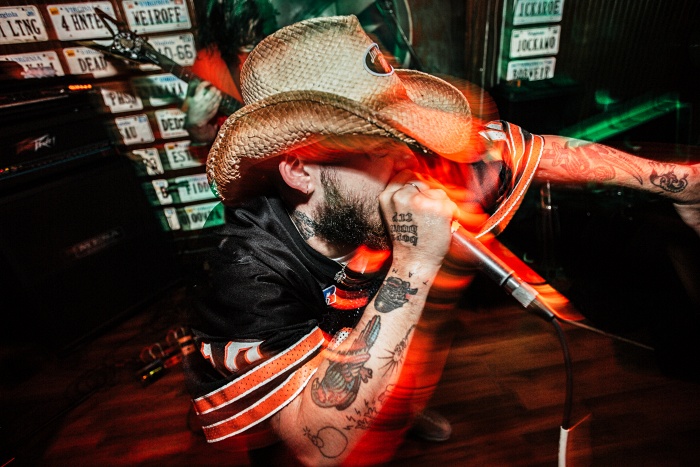
How are you distributing your records?
Ebullition, Revelation, it’s the same people, do you know what I mean? I go to stores personally a ton, probably honestly more than any other label. Like when I travel, so much, and I use some of it as an excuse for this label, and I try to talk to as many people as possible and give physical ads out to people. Just the ad saying, “We Won’t Let Hardcore Punk Die” is a trick in a way, ‘cause that means that I perceive that it’s dying or the people perceive that it’s dying, and it’s like, “Support It.” The “we” isn’t just me, or the label. I’m saying “we,” as in a scene. If you like these bands, support them.
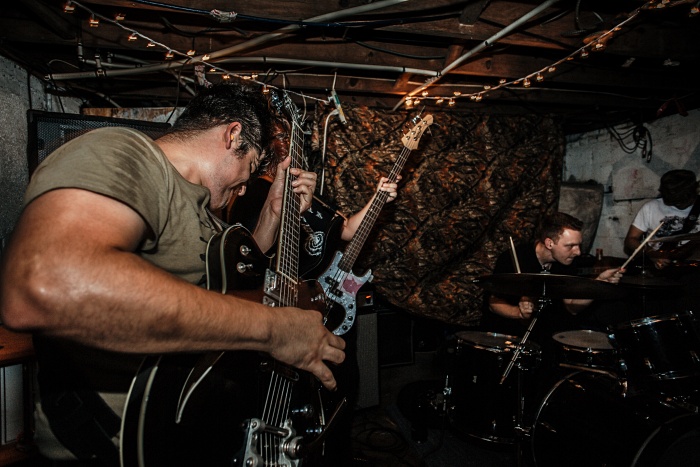
You are doing 300 copies of a record, do you think that that’s the limit, do you think you could actually do 1,000?
Well, I did 500 of the Gazm and it’s going alright. But it’s definitely the kinda thing where eventually, it will all sell out, but it’s probably gonna take a few years.
Do you think that is how it actually is or do you think that’s the perception of how it is?
I think that’s how it actually is, but here’s the thing—When we grow, we grow together with the label, and if I can get enough releases that people like, people would just start buying all of it. It’s what a lot of labels that started out of hobby labels have happen to them. For example, in Richmond specifically, Feel It and Beach Impediment sell out of so many copies of records. They sell thousands of records.
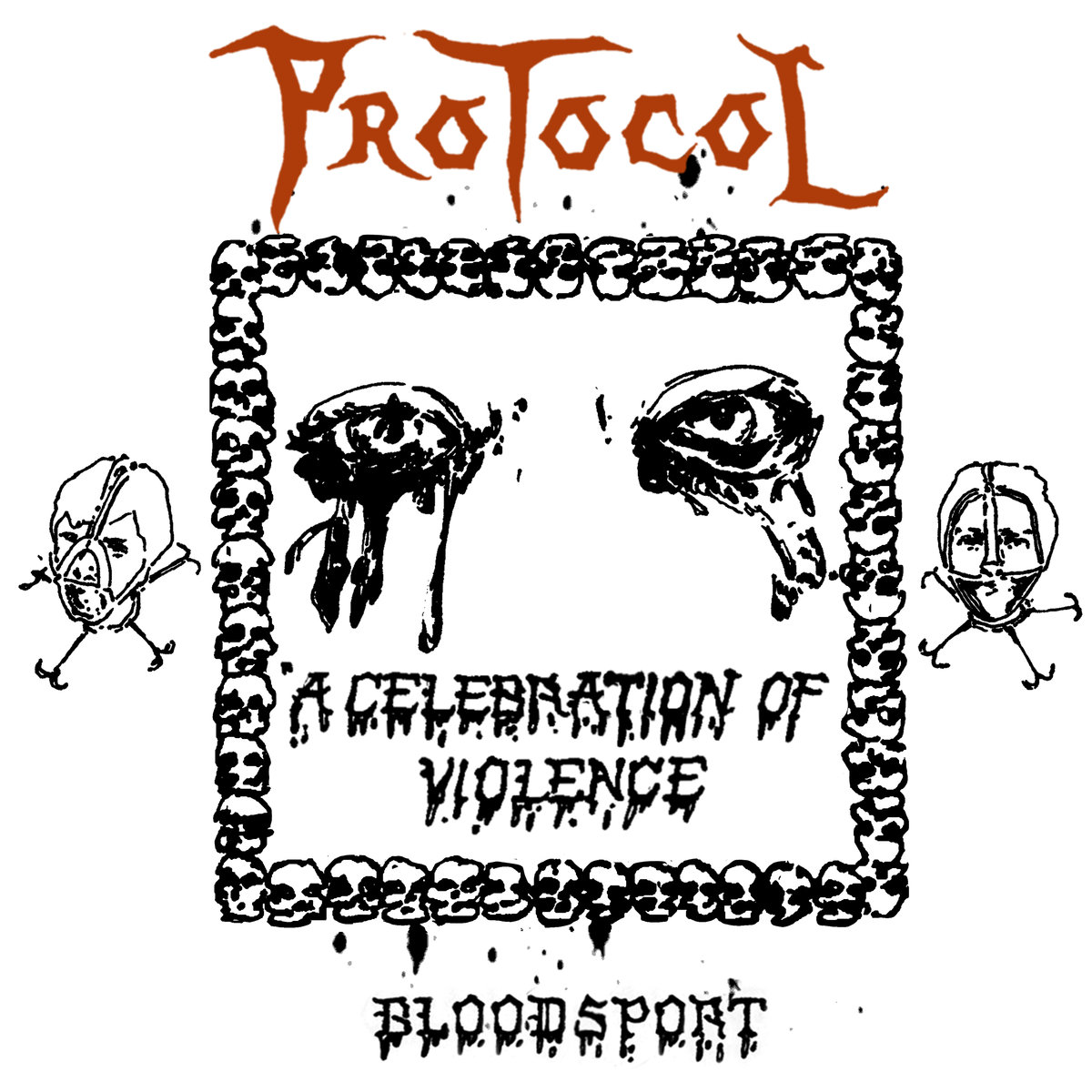
So the 10 records—what do you have coming up?
I got the Armor 7-inch… they’re from Tallahassee. I met them ‘cause Deviant played with them at their second show in Orlando in March. And they’re really good, really tight. They just did an East Coast tour in October with Protocol.
Then there’s this band Sniper Culture from Chicago, they’re just really cool. And they both are similar sounding and very, very good. I’m excited. They’re gonna be two of the best records of the year, for sure.
I really wanna put out, help Cadenaxo from Mexico City put out an LP ‘cause I love that band.
Is there a record you really wish you had put out, is there something that stands out that you’re like, “Oh, this is amazing?”
Oh, I wanted to put out the Public Acid LP, but I wasn’t ready in time. That was for sure what I wanted my first or second release to be. And I wanted to put out the Gumming LP too. But the timing was off.
You mentioned earlier the idea forming a clique of bands, does that sorta thing matter more to you than the music itself?
No, the music is definitely most important, but I wouldn’t wanna work with someone I didn’t respect. I’m also not the kinda label that’s gonna do it all for you. It’s something we’re doing together.
It’s more of, we’re not trying to reinvent any wheel—in some ways it’s like a tribute. We’re trying to give back to this thing that existed before us. We grew up going to these kinda shows, we wanna be in a band that plays that style, so that more people can get into it and while there’s definitely boundaries that are being pushed, but it’s not like we are experimenting on record or anything, do you know what I mean?
I guess to kinda wrap up, more than anything, closing thoughts... We kinda talked a bit about future of label, but I guess if there’s anything else you wanted to add, and about the label purpose, etcetera, etcetera.
I don’t know, you don’t have to grow out of hardcore punk--acting like some other genre’s more mature or whatever, is just total bullshit. It’s just like hardcore punk is simple and it exists to be simple. You add different elements to it, which is fine. But it exists as a simplistic art form in the same way... I don’t know... Pop music is. And I think that a lot of the way kind of the people that are on my label listen to pop music, too, when they realize that it’s sort of not that far off when it gets down to it.
Die-hards of any genre are gonna live a certain lifestyle. I honestly, a lot of times, even wonder how different their lives are. Someone that’s like, I don’t know, a die-hard jazz musician. How different are they than punks? I wonder. You know what I mean? They’re giving it all up for art. And a lot of what punks do is basically center their life around their art.
***
Pick up 11PM Records releases on vinyl at this link, and if you prefer digital, hit them up on Bandcamp.
Tagged: adderall, armor, deviant, gazm, protocol, record label profile


